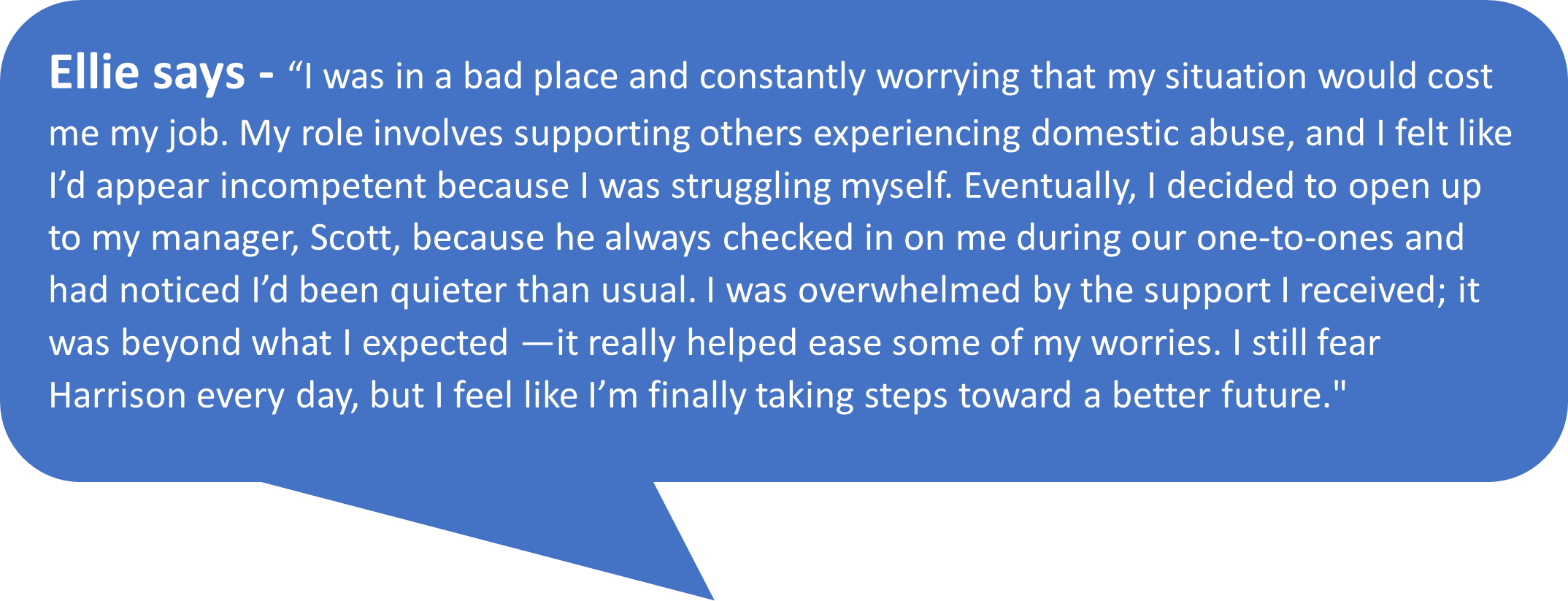Barriers for professionals accessing support, case study – Ellie’s story
“My role involves supporting others experiencing domestic abuse, and I felt like I’d appear incompetent because I was struggling myself.”
Ellie enjoyed and valued her job working for a housing association. However, for over two and a half years, Ellie’s ex-partner Harrison had subjected her to severe emotional and physical abuse, including coercive control and frequent threats to kill. Though arrests had been made, Harrison repeatedly breached conditions, causing Ellie ongoing fear and anxiety. Ellie was concerned Harrison would try to reach her through her workplace and jeopardise her job in the process. Knowing how much she loved her job; he had threatened to do this in the past.
Reaching out for help
Ellie talked to her manager, Scott, disclosing that she was a victim of domestic abuse, and the police were involved in the case.
Ellie explained that while Harrison did not know the exact location of her workplace, he was aware of her employment and her general routine. He had often driven by while she was waiting for her morning bus and knew the approximate times of her commute.
Gaining workplace support
After Ellie’s disclosure, Scott took immediate and proactive steps to ensure her safety both at work and during her commute. A comprehensive safety plan was developed, with Ellie’s input, to mitigate the risks posed by Harrison.
Ellie’s employer arranged for a taxi service to transport her to and from the office. This measure not only removed her from the public bus routes known to Harrison, but also ensured she could commute without fear.
Strict confidentiality measures were put in place to protect her privacy. Relevant staff were discreetly informed of Ellie’s situation and instructed not to share any information about her whereabouts to anyone. A photo of Harrison was circulated internally among staff so they could be on alert should he attempt to follow her to the office or arrive unexpectedly. Staffed were briefed on what to do should this happen to ensure safety for all.
A referral for counselling was made to support Ellie’s emotional well-being.
Ellie was fully supportive of these actions and appreciated the swift and sensitive response from her employer.
Conclusion
With safety measures in place, Ellie was able to continue working without the fear of losing her job. The combination of enhanced security and emotional support enabled Ellie to focus on rebuilding her life. This case demonstrates the importance of employer support in cases of domestic abuse and highlights how crucial workplace safety can be. Through understanding, collaboration, and prompt action, the organisation created a safer environment for Ellie, demonstrating their commitment to employee welfare.
For information on how to support your staff with domestic abuse, please see our good practice guide.
If you are experiencing domestic abuse our professional pathway to accessing services will be able to help you.



